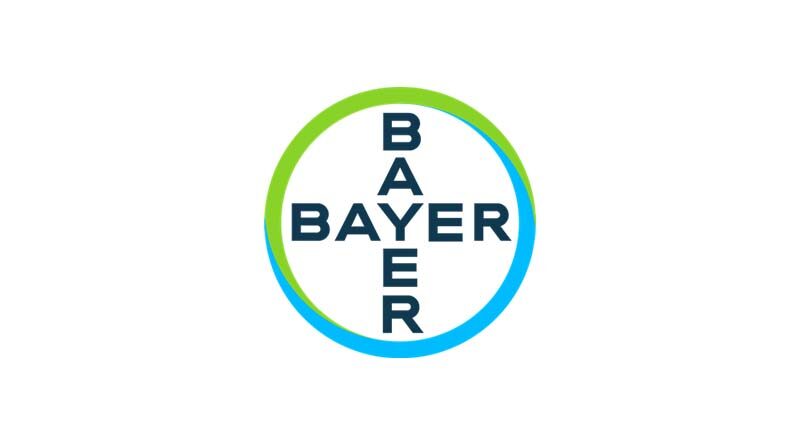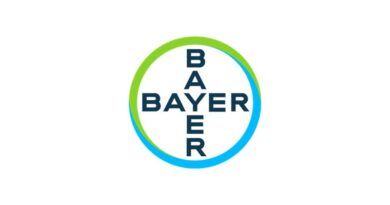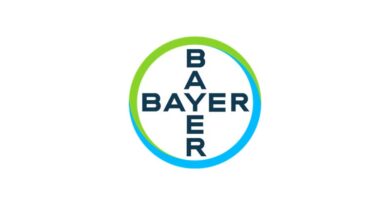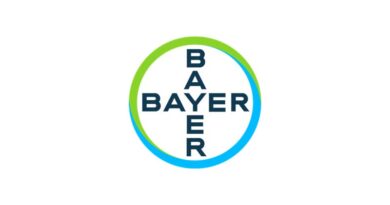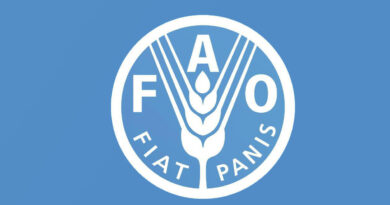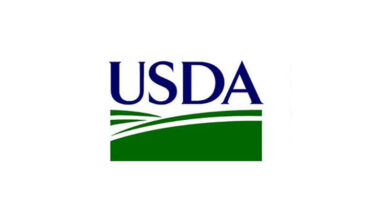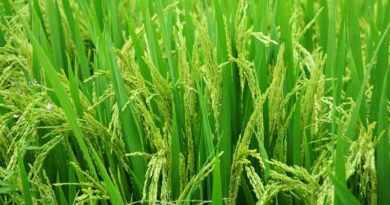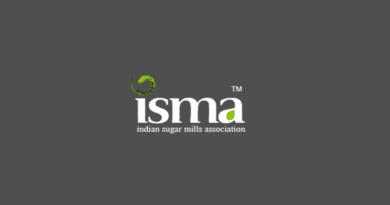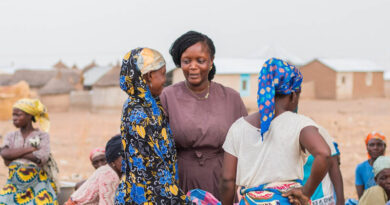Bayer: Significant growth in sales and earnings
28 February 2023, Leverkusen: The Bayer Group achieved strong growth last year, posting significantly higher sales and earnings. “2022 was a very successful year for Bayer despite the challenging environment. We were able to deliver, even during these difficult times, and met the upgraded financial targets we set in August,” said Werner Baumann, Chairman of the Board of Management, at the company’s Financial News Conference on Tuesday. The company is active in the right fields, he said. “Health and nutrition are fundamental human needs. Our vision of Health for all, hunger for none is and will remain vitally important, especially in times like these.”
Group sales came in at 50.739 billion euros in 2022, up 8.7 percent on a currency- and portfolio-adjusted basis (Fx & portfolio adj.). EBITDA before special items rose by 20.9 percent to 13.513 billion euros, and included a positive currency effect of 429 million euros (2021: negative currency effect of 507 million euros). The EBITDA margin before special items increased to 26.6 percent (2021: 25.4 percent). EBIT amounted to 7.012 billion euros, and was therefore more than twice as high as in the previous year. Net income came in at 4.150 billion euros (2021: 1.000 billion euros), while core earnings per share rose by 22.0 percent to 7.94 euros.
Free cash flow more than doubled against the prior year, rising to 3.111 billion euros. Net financial debt amounted to 31.809 billion euros as of December 31, 2022, down 4.0 percent from year-end 2021. Cash inflows from operating activities and the sale of the Environmental Science Professional business were partially offset by cash outflows for dividends and negative currency effects.
“These are very good results. Together with the Supervisory Board, we are therefore proposing a dividend of 2.40 euros to the Annual Stockholders’ Meeting. This represents a 20 percent increase compared to the previous year,” said Chief Financial Officer Wolfgang Nickl. With 982.42 million shares entitled to the dividend, the company is therefore set to distribute a total of 2.358 billion euros to stockholders for fiscal 2022 (fiscal 2021: 1.965 billion euros).
Crop Science achieves record sales and industry-leading margin
Sales in the agricultural business (Crop Science) advanced by 15.6 percent (Fx & portfolio adj.) to a record 25.169 billion euros, with business up in all regions. Growth was strongest at Herbicides (Fx & portfolio adj. 43.9 percent), which saw sales rise in Latin and North America and in Europe/Middle East/Africa in particular thanks to higher prices, as supply for glyphosate-based products was tight. Sales at Corn Seed & Traits rose 8.8 percent (Fx & portfolio adj.) as the division increased its market share. Price increases in all regions more than offset a decrease in acreages in North America and lower license revenues. Sales at Fungicides were up 5.2 percent (Fx & portfolio adj.), with higher prices in the Latin America and Europe/Middle East/Africa regions in particular more than offsetting a decline in volumes in North America. Sales at Soybean Seed & Traits were level with the prior year, with business growing in Latin America but declining in North America due to lower volumes.
EBITDA before special items at Crop Science advanced by 46.2 percent to 6.867 billion euros, mainly due to the significant increase in sales. Earnings also benefited from contributions from ongoing efficiency programs and a positive currency effect of 284 million euros (2021: negative currency effect of 387 million euros). By contrast, earnings were mainly diminished by an increase in the cost of goods sold, which was primarily due to high inflation. The EBITDA margin before special items increased by 4.1 percentage points to an industry-leading 27.3 percent.
Pharmaceuticals benefits from new products and Eylea™
Sales of prescription medicines (Pharmaceuticals) increased by 1.1 percent (Fx & portfolio adj.) to 19.252 billion euros. Over half a billion euros in sales came from the division’s new products: the cancer drug Nubeqa™ and Kerendia™ for the treatment of chronic kidney disease associated with type 2 diabetes. Sales of Nubeqa™, for instance, almost doubled year on year. Strong growth was also recorded for the ophthalmology drug Eylea™ (Fx & portfolio adj. plus 9.2 percent) and in the radiology business, which includes the Gadovist™ (Fx & portfolio adj. plus 9.0 percent) and Ultravist™ (Fx & portfolio adj. plus 17.5 percent) product lines. This was partially offset by declines due to factors such as additional tender procedures in China, especially for the oral anticoagulant Xarelto™ (Fx & portfolio adj. minus 5.8 percent) and the cancer drug Nexavar™ (Fx & portfolio adj. minus 41.2 percent). Xarelto™ sales were also impacted by price pressure in the United Kingdom and the expiration of the patent in Brazil.
EBITDA before special items at Pharmaceuticals rose by 1.6 percent to 5.873 billion euros, benefiting from the increase in sales and, to a lesser extent, from income from the sale of non-core businesses. Earnings were diminished by investments in marketing new products and higher research and development expenses for platform technologies and projects in advanced clinical development. In addition, higher costs due to a sharp increase in procurement prices had a negative effect. There was a positive currency effect of 9 million euros (2021: negative currency effect of 77 million euros). The EBITDA margin before special items declined by 1.0 percentage points to 30.5 percent.
Consumer Health grows business in all regions and categories
Sales of self-care products (Consumer Health) rose by 8.4 percent (Fx & portfolio adj.) to 6.080 billion euros, with growth in all regions and categories against a strong prior year. The Allergy & Cold business registered the strongest gains, with sales up by a significant 21.5 percent following continuously elevated cold incidence rates and the launch of the Astepro™ antihistamine nasal spray in the United States. The Dermatology category also achieved double-digit percentage growth (Fx & portfolio adj. 10.5 percent), in part due to higher demand for Bepanthen™. After a very strong prior year, the Nutritionals business also registered an increase in sales (Fx & portfolio adj. 1.0 percent).
EBITDA before special items at Consumer Health rose by 14.9 percent to 1.367 billion euros following the substantial increase in sales, strong contributions from productivity programs and active price management. The division achieved this growth in a business environment that was impacted by significant inflation-related cost increases while also making large investments in the launch of innovative products, especially for Astepro™. There was a positive currency effect of 85 million euros (2021: negative currency effect of 39 million euros). The EBITDA margin before special items came in at 22.5 percent, matching the prior-year figure.
Outlook: Further growth in sales – Earnings below prior year due to inflation and price factors
“Following two consecutive years of high single-digit percentage growth rates, we expect our business to remain at a high level and grow by two to three percent in 2023 on a currency- and portfolio-adjusted basis,” said Baumann. The company anticipates lower prices for agricultural herbicides as well as for some of its established pharmaceutical products. Projected sales growth in the other parts of the portfolio and from new products are expected to have a positive impact. As regards earnings in 2023, growth-driven margin contributions and positive effects from ongoing efficiency programs will not be sufficient to offset the anticipated decline in prices as well as high inflation-driven cost increases, which are expected to continue.
On a currency-adjusted basis (i.e. based on the average monthly exchange rates in 2022), Bayer expects to generate sales of 51 billion to 52 billion euros in 2023. The company anticipates EBITDA before special items of 12.5 billion to 13.0 billion on a currency-adjusted basis (Fx adj.). It forecasts core earnings per share of 7.20 to 7.40 euros (Fx adj.) and free cash flow of approximately 3.0 billion euros (Fx adj.). Net financial debt as of year-end 2023 is expected to amount to 32 billion to 33 billion euros (Fx adj.).
With respect to the divisions, Bayer anticipates sales growth (Fx & portfolio adj.) of around 3 percent at Crop Science, approximately 1 percent at Pharmaceuticals, and roughly 5 percent at Consumer Health. The company also expects the EBITDA margin before special items (Fx adj.) to come in at 25 to 26 percent at Crop Science, above 29 percent at Pharmaceuticals, and around 23 percent at Consumer Health.
Bayer has also prepared its guidance based on the closing exchange rates as of December 31, 2022, and the differences to the currency-adjusted forecast above are as follows: Group sales are expected to come in at 50 billion to 51 billion euros, and the Pharmaceuticals Division’s EBITDA margin before special items is projected to amount to around 30 percent.
Major strides in innovation and sustainability
Bayer has also made significant progress in launching and developing innovations. This is evident in the Pharmaceuticals Division, for instance, with the products Nubeqa™ and Kerendia™ as well as projects in late-stage development, such as asundexian for the prevention of stroke in atrial fibrillation patients and elinzanetant for the treatment of women in menopause. The company currently believes that these major growth drivers have a combined peak sales potential of over 12 billion euros annually. The Crop Science Division advanced the launch of new products that are designed to protect harvests even more effectively and reduce environmental impact. In the field of biologicals, it shifted its research approach to an open innovation model, with the division engaging in strategic collaborations with the Boston-based biotech company Ginkgo Bioworks and the Spanish biologicals company Kimitec, for example. Finally, the Consumer Health Division strengthened its product portfolio with the addition of Astepro™, the first steroid-free antihistamine spray on the US market that is available over the counter. It starts to work much faster, providing allergy sufferers with the relief they need.
Turning to the company’s sustainability targets, Baumann explained: “In 2022, we once again managed to reduce our greenhouse gas emissions overall – while at the same time achieving dynamic growth in our businesses.” The company’s efforts are gaining ever greater recognition, he remarked, with MSCI having upgraded its environmental, social and governance (ESG) rating for Bayer from “BB” to “A”. In addition, the company has for the first time made it into the top ten in the renowned Access to Medicine index, Baumann added. The index ranks companies in terms of their related endeavors in low- and middle-income countries. Bayer is also making good progress in attaining its ambitious social responsibility goals, he said. By 2030, the company aims to help 100 million smallholder farmers in low- and middle-income countries (LMICs), satisfy the need of 100 million women in LMICs for modern contraception, and support 100 million people in underserved communities with self-care.
Also Read: Union Budget 2023: An Overview of the Focus on Agriculture
(For Latest Agriculture News & Updates, follow Krishak Jagat on Google News)

